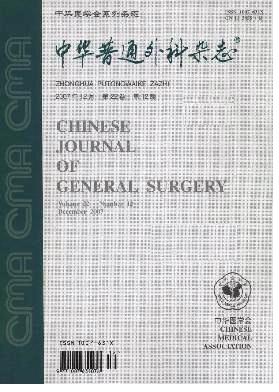Metformin improves oxaliplatin resistance in colorectal cancer cells by inhibiting EIF3G expression
引用次数: 0
Abstract
Objective To analyze the mechanism of metformin in improving oxaliplatin resistance of colorectal cancer cells. Methods The expression levels of EIF3G in 71 cases of colorectal cancer and adjacent tissues were detected by RT-qPCR. The survival curve was established by Kaplan-Meier method. The survival rate difference between the two groups was compared by Log-rank test.HCT-116 cells were infected with shEIF3G lentivirus, HCT-116 L-OHP-resistant cell line was constructed.After treated with metformin, sensitivity to L-OHP was detected by CCK-8 assay, RT-qPCR and Western blot were used to analyze the EIF3G mRNA and protein levels. The subcutaneous tumor model of nude mice was constructed to observe the effect of metformin on tumor growth. Results The expression level of EIF3G mRNA in colorectal cancer tissues was up-regulated by (3.24±0.43) times compared with paraneoplastic tissues (P<0.01). EIF3G level was significantly correlated with the prognosis of colon cancer patients. Knockdown EIF3G could enhance the L-OHP sensitivity of HCT116/L-OHP cells (P<0.05); Metformin can reduce the expression level of EIF3G and improve the drug resistance of HCT116/L-OHP cells (P<0.05), and inhibit the development of colorectal cancer in vivo (P<0.05). Conclusion Metformin can inhibit the expression of EIF3G and improve the L-OHP resistance of HCT-116 cells. Key words: Colorectal neoplasms; Metformin; Drug resistance, neoplasms二甲双胍通过抑制EIF3G表达改善结直肠癌细胞对奥沙利铂的耐药性
目的探讨二甲双胍改善结直肠癌细胞对奥沙利铂耐药的作用机制。方法采用RT-qPCR检测71例结直肠癌及癌旁组织中EIF3G的表达水平。采用Kaplan-Meier法建立存活曲线。采用Log-rank检验比较两组患者的生存率差异。用shEIF3G慢病毒感染HCT-116细胞,构建HCT-116抗l - ohp细胞系。二甲双胍处理后,采用CCK-8法检测小鼠对L-OHP的敏感性,RT-qPCR和Western blot检测EIF3G mRNA和蛋白水平。建立裸鼠皮下肿瘤模型,观察二甲双胍对肿瘤生长的影响。结果EIF3G mRNA在结直肠癌组织中的表达水平较副肿瘤组织上调(3.24±0.43)倍(P<0.01)。EIF3G水平与结肠癌患者预后有显著相关性。敲除EIF3G可增强HCT116/L-OHP细胞对L-OHP的敏感性(P<0.05);二甲双胍可降低EIF3G的表达水平,提高HCT116/L-OHP细胞的耐药水平(P<0.05),抑制体内结直肠癌的发展(P<0.05)。结论二甲双胍可抑制EIF3G的表达,提高HCT-116细胞对L-OHP的抗性。关键词:结直肠肿瘤;二甲双胍;耐药性,肿瘤
本文章由计算机程序翻译,如有差异,请以英文原文为准。
求助全文
约1分钟内获得全文
求助全文

 求助内容:
求助内容: 应助结果提醒方式:
应助结果提醒方式:


